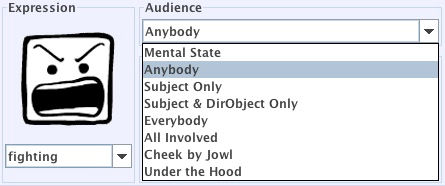SWAT TUTORIAL
Audience Requirements
Audience Requirements
The Audience setting for a Verb is specified using the Audience menu in the Properties box.

Most of the time we don't really care who else is present on the Stage on which the Subject is executing a Verb—our only concern is that the DirObject, if there is one, must be there. After all, Joe can't punch Fred if Fred isn't there. However, there are a few situations that impose special considerations on who must be present—or absent—from a Stage in order for the Subject to execute the Verb. In other words, the Subject might balk at executing the Verb if the wrong people are present. We handle these requirements using the "Audience" specification for the Verb. Here are some examples:
The above Audience settings will cause a Subject to delay executing the Verb until the Audience requirements are satisfied. However, there are also some Audience settings that won't cause an Actor to defer execution of the Verb; they only control who gets to witness the execution of the Verb. These are:
Previous tutorial: System Verbs Next tutorial: More About Attributes

Most of the time we don't really care who else is present on the Stage on which the Subject is executing a Verb—our only concern is that the DirObject, if there is one, must be there. After all, Joe can't punch Fred if Fred isn't there. However, there are a few situations that impose special considerations on who must be present—or absent—from a Stage in order for the Subject to execute the Verb. In other words, the Subject might balk at executing the Verb if the wrong people are present. We handle these requirements using the "Audience" specification for the Verb. Here are some examples:
Anybody: This is the default audience requirement setting. Anybody means anyone present on the Stage where the Event occurs. Use this setting when it doesn't matter who is present. All Actors present witness the Event. Subject Only: Use this when the Subject is up to something that he doesn't want anybody else to know about. For example, he's engaging in shameful solitary sexual practices, or preparing the equipment for a crime, or doing something stupid. If your Verb demands privacy for the Subject, then use the "Subject Only" Audience setting. Subject & DirObject Only: Use this Audience setting when Subject and DirObject must both be present, and nobody else. For example, you might want to use this for Verbs of an intimate romantic or sexual nature. All Involved: Every Actor involved in the Event must be present. This would apply to any additional Actor WordSockets. You might use this for a Verb such as "counsel antagonists" wherein the Subject admonishes two other people to kiss and make up. Obviously, this Verb won't work if one of those people is missing. |
The above Audience settings will cause a Subject to delay executing the Verb until the Audience requirements are satisfied. However, there are also some Audience settings that won't cause an Actor to defer execution of the Verb; they only control who gets to witness the execution of the Verb. These are:
Everybody: This applies to an Event so sensational that everybody is instantly aware of the Event. The grapevine spreads the word spontaneously. Think of how everybody in America knew about 9/11 almost immediately. When you use this Audience setting, everybody witnesses and reacts to it immediately, regardless of their locations. Mental State: the Subject is thinking about something, making a decision. Although other Actors may be on the same Stage, they are unaware of Subject's action. Cheek by Jowl: the Subject and DirObject are leaning close together, whispering to each other. Other Actors on the same Stage are unaware of this Event. Under the Hood: nobody witnesses, and Event does not go into HistoryBook. You should only use Fate as the Subject of an Under the Hood Verb. |
Previous tutorial: System Verbs Next tutorial: More About Attributes